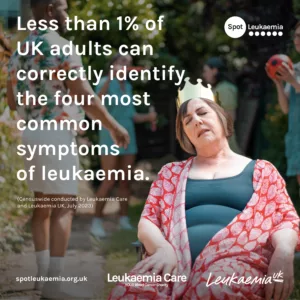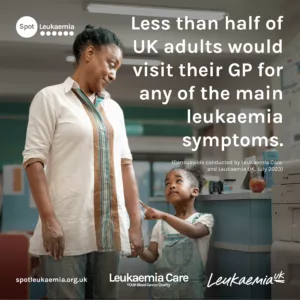
04 Sep 2023 Awareness raising
Less than 1% of Brits can identify all the most common symptoms of one of the deadliest types of cancer
New research launched today by Leukaemia Care and Leukaemia UK reveals that less than 1% (0.4%) of UK adults can accurately identify the four most common symptoms of leukaemia – fatigue, bruising, repeat infections and unexplained bleeding. Almost two fifths (37%) are unable to identify any symptoms at all.
The findings have been released as part of the charities’ #SpotLeukaemia campaign, launched this Blood Cancer Awareness Month to urgently tackle widespread lack of awareness of leukaemia signs and symptoms, which can mean people are often diagnosed late.
 Late diagnosis impacts survival rates. Only half of leukaemia patients live longer than five years after their diagnosis, making it one of the deadliest forms of cancer. Despite early diagnosis being so critical in successfully treating leukaemia, the survey also found that fewer than 50% of UK adults actually would visit a medical professional if they were experiencing one of the four most common symptoms.
Late diagnosis impacts survival rates. Only half of leukaemia patients live longer than five years after their diagnosis, making it one of the deadliest forms of cancer. Despite early diagnosis being so critical in successfully treating leukaemia, the survey also found that fewer than 50% of UK adults actually would visit a medical professional if they were experiencing one of the four most common symptoms.
#SpotLeukaemia encourages the public to “channel their inner 5-year-old” by asking themselves the difficult questions that could help spot leukaemia. In a new film released ahead of Blood Cancer Awareness Month, children are shown asking their grandparents awkward and embarrassing questions – such as, “Why is your belly squishy?” or, “Why do you have hair up your nose?”. The same children are shown then asking, “Why do you have bruises on your arm?” or, “Why are you always too tired to play?”.
The film then urges anyone experiencing unusual symptoms to “channel your inner 5-year-old and ask why”. If the viewer is experiencing fatigue, bruising, unusual bleeding or repeated infections, they are urged to contact their GP and request a blood test.
Zack Pemberton-Whiteley, Chief Executive of Leukaemia Care said: “The statistics from our recent survey show just how worryingly low awareness of leukaemia is and why our Spot Leukaemia campaign is so very important in changing people’s perceptions of this form of blood cancer. The survey found that just 0.4% of those who responded (2,002 people), could identify all four of the main symptoms of leukaemia – fatigue, unusual and unexplained bruising or bleeding, and repeated infections – a shockingly low number. This figure, that just 8 people from those answering could identify an illness where early diagnosis is crucial, tells us we still have a lot of work to do around the understanding of leukaemia to help increase survival rates going forward. If the public can learn more about the signs and symptoms, they may well save someone’s life.
27 people a day are diagnosed every day, just under 10,000 a year – we want to keep working towards helping people to know what to look for. Our new campaign video will no doubt bring smiles to the faces of those watching, maybe a laugh, but the message is incredibly serious. By asking ‘why’ and channelling your inner 5-year-old, it might make you think twice when you, or someone you know, is feeling that bit more tired than usual, develops unexplained bruising or seems to have frequent or persistent infections. If this sounds familiar, don’t be afraid to think ‘why’, remember the children’s questions and don’t delay in asking your GP for a blood test, it could make all the difference.”
Fiona Hazell, Chief Executive of Leukaemia UK, said: “It’s concerning to learn that so few UK adults can correctly identify the four most common symptoms of leukaemia, or even any symptoms at all. Each day in the UK 27 people are diagnosed with leukaemia, and despite decades of progress, only half of leukaemia patients will live longer than five years after diagnosis. Spotting the signs of leukaemia and asking for that all-important blood test can make a meaningful difference in treating this disease.
 “That’s why it’s even more concerning to learn that most people would not visit their GP if experiencing one of the four most common symptoms. We would encourage anyone who is concerned about leukaemia to make an appointment to request a blood test as soon as possible.”
“That’s why it’s even more concerning to learn that most people would not visit their GP if experiencing one of the four most common symptoms. We would encourage anyone who is concerned about leukaemia to make an appointment to request a blood test as soon as possible.”
When asked why they would not contact their GP if experiencing any unusual symptoms, 26% of UK adults selected “don’t want to put additional pressure on the NHS” as their main reason. Long waiting times were also listed as an off-putting factor, with 23% of UK adults citing this as their main reason for not getting in touch.
Leukaemia is a form of blood cancer which affects people of all ages but is most common in the over 65s. The four most common symptoms of leukaemia are fatigue, repeat infections, unusual bleeding and unexplained bruising. Other symptoms of leukaemia can include fever or night sweats, bone or joint pain and swollen lymph nodes.
For more information, please visit www.spotleukaemia.co.uk.
Related posts
4 August 2020
Our life-saving work must continue
Leukaemia and other blood cancers don’t stop for coronavirus (COVID-19) and our vital research and care must continue
16 November 2021
Charities call on NHS to treat blood cancer equally in decision-making
The Blood Cancer Alliance undertook an evidence review to inform a new report exploring the unmet needs of people with blood cancer across the UK.
11 January 2019
Myelofibrosis: Finding new ways to treat patients
Dr Edwin Chen, University of Leeds and John Goldman Fellow
12 October 2022
“Who’s Cooking Dinner?” makes a spectacular return to The Dorchester
On 10th October 2022, Leukaemia UK’s flagship fundraising event, “Who’s Cooking Dinner?”, returned to The Dorchester Hotel. Above: Fiona Hazell, Leukaemia UK Chief Executive, Iona Beastall and Dr Kostas Tzelepis….